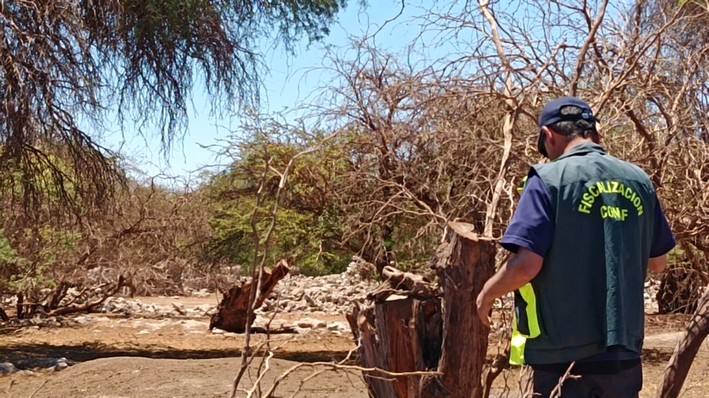During a routine patrol conducted in the El Algarrobal sector of the Pampa del Tamarugal National Reserve, park rangers and Conaf inspectors caught two individuals carrying out an Unauthorized Cutting of carob trees, a native species of high ecological value for the local ecosystem.
At the scene, the offenders were identified as they were caught cutting down carob trees without authorization from Conaf. According to the information gathered on-site, the pickup truck they were using was transporting approximately 1,500 kilograms of native wood. Furthermore, the field inspection revealed the illegal cutting of 9 carob tree specimens, used for charcoal production.
"The logging of native species such as the carob tree severely affects the environmental balance and the well-being of local communities. We will continue to strengthen inspection efforts and collaborate with authorities to ensure these acts do not go unpunished," stated the regional director of Conaf, Natalia Ortega Osses.
All collected information along with the field inspection report were made available to the Local Police Court of Pozo Almonte to proceed with the process in accordance with the current Native Forest Law regulations.
Wetland Damage in Volcán Isluga Park
On October 28, park rangers from Volcán Isluga National Park went to the Chaguane sector to hold a meeting with the local community. During the meeting, residents reported that the wetland located in the La Vertiente area of the Chaguane village had suffered severe damage due to earthmoving activities carried out with heavy machinery.
Following the technical inspection, Conaf professionals determined that the damage covers approximately 400 m2 in the water accumulation pond area, a crucial infrastructure for the water supply of the localities from Chaguane to Enquelga.
The entry and use of a backhoe caused crushing and uprooting of hydrophilic vegetation, as well as soil compaction and extraction, altering its porosity and infiltration capacity. This directly affects the water balance of the wetland, an essential ecosystem in high-Andean regions.
During the survey, the Unauthorized Cutting of 6 completely destroyed queñoa individuals was also identified, representing a significant environmental impact given the species' slow growth and restricted adaptation to extreme high-Andean ecosystems. Moreover, being a protected species within a national park, its destruction constitutes a direct alteration to the conservation objectives of the protected area.
Collectively, the observed damages represent environmental degradation that requires urgent mitigation and restoration measures to recover the ecological and socio-economic functions of the affected area.
"As Conaf, we reiterate our commitment to protecting our ecosystems and will not tolerate any type of illegal intervention in our protected areas," concluded Director Natalia Ortega.







Comments (0)
No comments yet. Be the first to comment!
Leave a comment